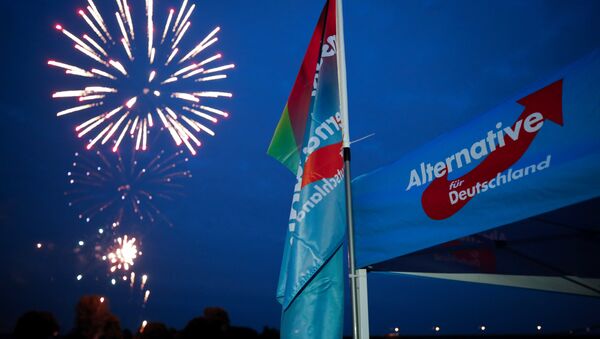The year 2019 is a busy one for German politicians. Besides the EU vote scheduled for 26 May, ballots will be cast on the same day in several state and municipal elections, which include 10 key cities and regions (such as Hamburg, Saxony and Thuringia). In September, German voters will go back to polling stations to pick candidates in state elections in Brandenburg and Saxony.
Two AfD members have told Sputnik that the violence is mostly provoked or carried out by AfD's left-wing opponents.
According to Alternative for Germany (AfD) activists, the atmosphere and the tone of political debate have become rather heated, and the reason is the growing popularity of right-wing and conservative ideas.
"Other parties are afraid that AfD will get too many votes", says Berlin regional parliamentary deputy and AfD member Gunnar Lindemann. "So, they try to fight against our party and our ideas — of course, not in a good way".
Gunnar Lindemann is one of several AfD politicians taking part in this year’s Yalta Economic Forum in Crimea. Even though their visit to Russia is a private one, Ukraine and Bonn diplomats strongly objected to it. pic.twitter.com/eKQPZ7Zhy6
— Denis Bolotsky (@BolotskySputnik) 19 апреля 2019 г.
AfD is known for its right-wing agenda, its tough stance on illegal immigration, but also for its calls to improve relations with Russia. The latter, according to Gunnar Lindemann, often lands the party in hot water, and the number of mainstream media attacks is increasing.
AfD's Gunnar Lindemann: “Yesterday I read in German newspaper that German mass media make propaganda against AfD because AfD wants good relations with Russia. But this is our policy, because we need good relations between Germany and Russia.” pic.twitter.com/1dQCbkWUFR
— Denis Bolotsky (@BolotskySputnik) 19 апреля 2019 г.
The "clash of ideas" in Germany seems to have gone beyond political debate, newspaper articles, and TV screens, as AfD members are also complaining about physical attacks.
READ MORE: Asylum Cheaters Will Still Be Allowed to Remain in Germany — AfD Member
AfD member Richard Gretzinger told Sputnik that when his comrades are beaten up by "left-wingers", they are afraid to protect themselves.
"They break our signs, they pour paint over us. We cannot respond physically, because they will sue us. But they can do whatever they want — kick us, hit us etc. We call the police, but they don't stick around, they tend to leave rather quickly".
In the city of Essen the situation has escalated far beyond regular fights, as three AfD campaign cars were set on fire on Thursday by unknown perpetrators on former refugee camp grounds. AfD has suspected involvement of left-wing radicals and asked for police protection.
AfD-Autos wurden in Essen verbrannthttps://t.co/ihpeKc2ILz pic.twitter.com/UzZPLIejhH
— News Front (@NewsFrontDE) 18 апреля 2019 г.
Despite the attacks, the AfD is quite optimistic about how it will perform in the upcoming EU parliamentary and domestic elections, as its popularity appears to be on the rise. In 2017, the party became the third largest political force in the Bundestag.
BREAKING: Eurosceptic AfD surge according to exit polls. Gained huge support after Merkel opened the floodgates! 🇩🇪https://t.co/2RpvhYvZfy
— Leave.EU (@LeaveEUOfficial) September 24, 2017
Right-wing movements are also winning in neighbouring countries. In March 2019, the Dutch conservative and anti-immigration party Forum for Democracy made a giant leap forward in the provincial elections, becoming the biggest political party in the Senate and stole the majority from Mark Rutte's VVD – something that probably makes the AfD even more certain that conservative ideas might resonate with German voters. But whether the AfD will be able to repeat the success of their Dutch neighbours, or other conservative EU parties during the 26 May vote – remains to be seen.



